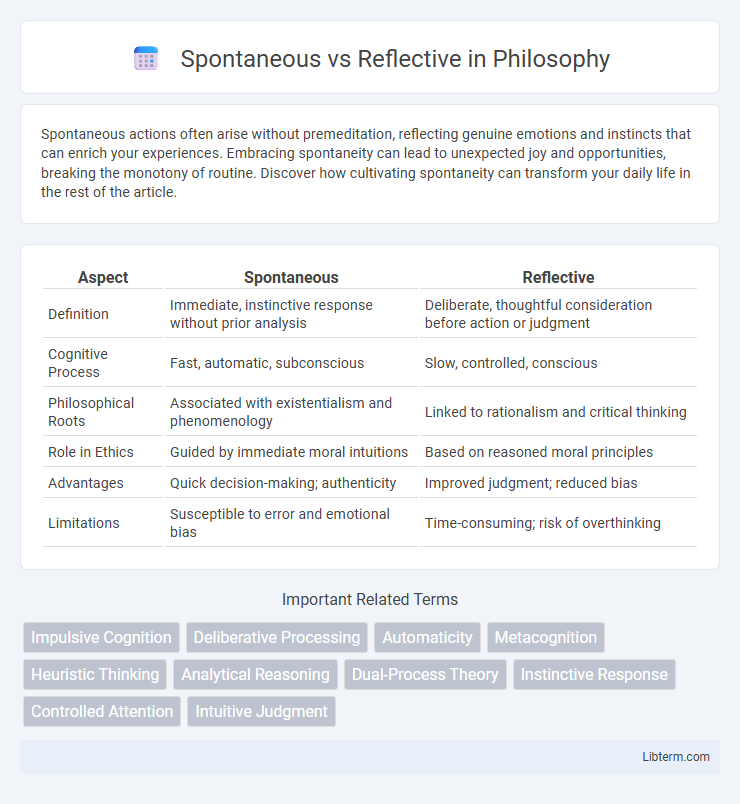Spontaneous actions often arise without premeditation, reflecting genuine emotions and instincts that can enrich your experiences. Embracing spontaneity can lead to unexpected joy and opportunities, breaking the monotony of routine. Discover how cultivating spontaneity can transform your daily life in the rest of the article.
Table of Comparison
| Aspect | Spontaneous | Reflective |
|---|---|---|
| Definition | Immediate, instinctive response without prior analysis | Deliberate, thoughtful consideration before action or judgment |
| Cognitive Process | Fast, automatic, subconscious | Slow, controlled, conscious |
| Philosophical Roots | Associated with existentialism and phenomenology | Linked to rationalism and critical thinking |
| Role in Ethics | Guided by immediate moral intuitions | Based on reasoned moral principles |
| Advantages | Quick decision-making; authenticity | Improved judgment; reduced bias |
| Limitations | Susceptible to error and emotional bias | Time-consuming; risk of overthinking |
Understanding Spontaneity and Reflection
Spontaneity involves immediate, instinctive reactions driven by intuitive thought processes, often resulting in creative and flexible problem-solving. Reflection requires deliberate, analytical thinking that evaluates experiences and decisions to foster deeper understanding and informed choices. Understanding the balance between spontaneous responses and reflective thinking enhances cognitive adaptability and emotional intelligence.
Defining Spontaneous Behavior
Spontaneous behavior refers to actions that occur without premeditation, arising naturally in response to immediate stimuli. This type of behavior is typically unconscious, driven by instinct, emotion, or habit rather than deliberate thought processes. Defining spontaneous behavior involves understanding its automatic nature, contrasting it with reflective behavior, which requires conscious decision-making and analysis.
The Nature of Reflective Thinking
Reflective thinking involves deliberate analysis and evaluation of experiences to gain deeper understanding and insight. This cognitive process requires conscious effort to examine assumptions, explore alternatives, and integrate new knowledge, promoting critical thinking and informed decision-making. Its nature is characterized by systematic self-questioning and thoughtful consideration, distinguishing it from automatic, intuitive reactions.
Psychological Roots of Spontaneous Actions
Spontaneous actions often originate from the brain's limbic system, which governs emotion-driven behavior and immediate responses, bypassing the slower, more deliberate processes of the prefrontal cortex involved in reflective thinking. Psychological studies highlight that spontaneity is closely linked to low inhibitory control and heightened sensitivity to emotional stimuli, facilitating rapid decision-making without extensive conscious deliberation. These spontaneous behaviors provide adaptive advantages in situations requiring quick reaction but can also lead to impulsive choices lacking foresight.
Cognitive Processes Behind Reflection
Spontaneous thinking involves automatic, fast cognitive processes driven by immediate stimuli and intuition, while reflective thinking engages slower, deliberate cognitive mechanisms such as metacognition and critical analysis. Reflection activates the prefrontal cortex, facilitating self-monitoring, evaluation of past experiences, and strategic problem-solving. This cognitive process enhances learning and decision-making by promoting deeper understanding and intentional thought restructuring.
Benefits of Being Spontaneous
Being spontaneous enhances creativity by encouraging quick decision-making and embracing new experiences without overthinking, which can lead to unexpected opportunities and personal growth. It reduces stress by allowing individuals to live in the moment and respond authentically to situations, fostering emotional resilience and adaptability. Spontaneity also strengthens social connections through genuine interactions and shared adventures, making relationships more vibrant and memorable.
Advantages of Reflective Decision-Making
Reflective decision-making enhances outcomes by allowing thorough analysis of available information, leading to well-informed and deliberate choices. It reduces the risk of errors caused by impulsive reactions and helps in anticipating potential consequences. Engaging in reflective processes fosters critical thinking and supports long-term strategic planning across various domains such as business, education, and healthcare.
When to Act Spontaneously vs Reflectively
Act spontaneously when quick decisions are necessary, such as in emergencies or creative brainstorming sessions, where immediate reactions can capitalize on intuition and emotional intelligence. Reflective action suits complex problems requiring careful analysis, moral reasoning, or long-term planning, allowing for deliberation and weighing consequences. Balancing spontaneous responses with reflective thinking enhances adaptability and decision quality in dynamic environments.
Balancing Spontaneity and Reflection in Daily Life
Balancing spontaneity and reflection in daily life enhances decision-making quality by blending impulsive creativity with thoughtful analysis. Spontaneous actions stimulate innovation and immediate problem-solving, while reflective thinking fosters deeper understanding and long-term planning. Integrating these approaches enables individuals to respond adaptively to dynamic situations while maintaining clarity and purposeful direction.
Cultivating Both Traits for Personal Growth
Balancing spontaneous and reflective traits fosters holistic personal growth by enabling quick decision-making alongside thoughtful analysis. Cultivating spontaneity sharpens intuition and adaptability in dynamic situations, while developing reflection enhances critical thinking and long-term goal alignment. Integrating both traits cultivates emotional intelligence, resilience, and a well-rounded approach to problem-solving and self-improvement.
Spontaneous Infographic

 libterm.com
libterm.com